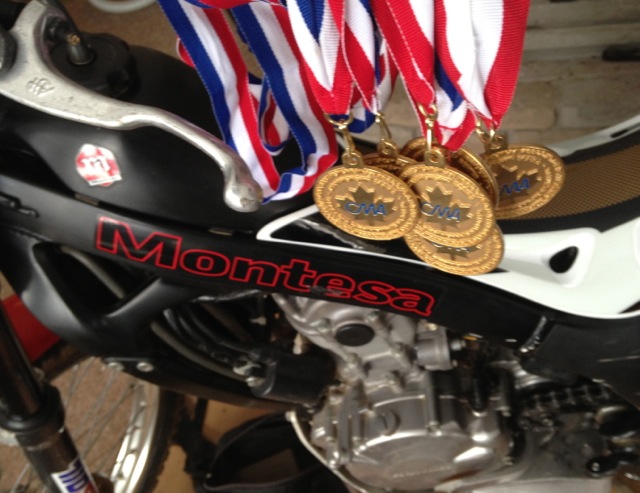There are numerous organisations that "sanction" (basically, "organize") roadracing around the world, which range from small regional organisations (local examples include SOAR, RACE, VRRA), to national ones (locally, this is CSBK Canadian
Superbike Championship), to international ones (WorldSBK, MotoGP).
Each one of these has their own rulebook and their own points-scoring system as described in the post above and they each operate their own "series" - schedule of events through each season. They generally all operate independently, although there are a couple of "world" organisations that you need to know about - the main one being the FIM (Federation International de Motocyclisme).
The way it's supposed to work is that each country has their own FIM-affiliated organising body (in our case, it's the CMA, in the USA it's the AMA) who represents that country's interests in the FIM and in turn operates that country's local racing series in a manner consistent with the FIM. This is so that generally things work the same internationally. A checkered flag means the same thing everywhere, a stationary yellow flag means the same thing everywhere, rider credentials are mutually recognised so that a rider can be trained anywhere and race anywhere, etc. It so happens that Canada is messed up, because our official FIM representative, the CMA, doesn't actually do anything, and the local racing organisations that actually do something (SOAR, RACE, CSBK) don't have anything to do with the CMA, which complicates the transition of Canadian riders to the international stage, but be that as it may ...
"How do you win" ...
You generally start riding at 3 or 4 years old because dad is already a racer. You graduate through minibikes or dirt bikes or whatever, to the point where you want to ride on pavement, and dad buys you an entry level
race bike for whatever the entry-level
class is in your local racing series, you go there and ride the wheels off it in whatever they call that
class (novice, or lightweight something, etc). You win that series and if you are young enough, maybe attract some attention and move up to the national series, and perhaps win that, and then either spend huge money or get huge sponsorship and ride internationally in the entry-level
class (e.g. WorldSSP300 for production-based "300"
class bikes for WorldSBK, or Moto3 for MotoGP), and if you manage to win that then move up to WorldSSP (for production-based "600"
class bikes for WorldSBK or Moto2 for MotoGP), and if you manage to win that then move up to WorldSBK or MotoGP and become world champion.
... except that most people either run out of talent, money, health, or time at some point. Or they stop at their comfort level in the realisation that if they go to the next level, they'll not go any further. In my case, it's regional-level Lightweight
Superbike or equivalent. In Jordan Szoke's case, it's national-level (CSBK)
Superbike ...
A lot of riders locally start with track days. The best place to start is to take a training course first. Locally, Racer5 or FAST are good choices. Those will get you the basics of how to operate your motorcycle on the track. Then start with the slow group, when you outrun them move to the intermediate group, then when you outrun them move to the advanced group ... and if you're fast there then it's time to get that regional roadracing license.
Top of your current level tends to mean back of the pack in the next level until you figure out what's what. Fastest yellow-group rider? Back of the red group. Fast track-day rider? Maybe you'll do okay in novice roadracing until you figure out what's what there. Bump up to Amateur, back of the pack again, until you get some speed. It gets tougher and tougher the higher you go.
As a point of reference, I'm 20 seconds a lap off WorldSBK or MotoGP pace at Phillip Island. Some of that is due to being on a bone stock rental production bike (S1000RR) with DOT
tires. But make no mistake ... most of that is because my name is neither Marc Marquez nor Jonathan Rea. But still, at that track-day, plenty of riders were 20 seconds off my pace.
I didn't have the benefit of parents who understood motorcycles at all. I never touched one until I was 21. By that age, Valentino Rossi (whose father was a roadracer) was winning world championships. Jonathan Rea's
grandfather was a roadracer.
Valentino Rossi has an autobiography book, "What if I had never tried it", which is getting to be a few years old (2005). I just re-read my copy.
Jonathan Rea has one, "Dream. Believe. Achieve", which is a couple of years old, he's since won two more WorldSBK titles. I just got that for Christmas, and I'll be reading that this week.

